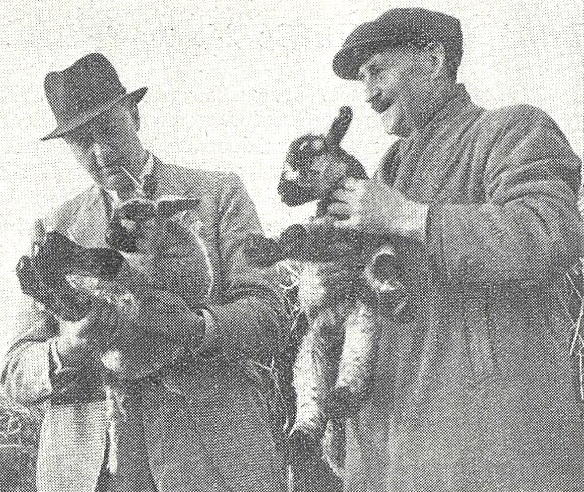OTD in early British television: 1 February 1939

John Wyver writes: In the depths of winter, on the afternoon of Wednesday 1 February 1939, one of the mobile outside broadcast units made a first visit to Bulls Cross Farm at Waltham Cross, just off the A10 10 miles north of Alexandra Palace. This Month on the Farm would become a regular monthly OB through to the autumn, and was the pre-war precursor to the likes of Countryfile (1988- ) and Lambing Live (2010-2014).
The exact location of the farm was kept a secret from viewers, but this was the first significant trip out of town for television. To date, the television world of OBs was predominantly urban, featuring the sites and sights of pageantry and commemoration. Television more generally was similarly a creature of the city, with the West End its dominant source of theatre and cabaret, and with its audiences concentrated in suburbia centred on AP. With This Month on the Farm, television began its long and complex relationship with the land.
Writing in The Listener, Peter Purbeck recognised how, with this broadcast, the (male) viewer
has become part owner of a television farm. True, he does not make a profit out of it (or at least his profit is in pleasure and not in cash) and he cannot himself buy and sell his stock and decide the sequence of his crops. But… he will be able to watch the crops ripening and the calves and lambs and foals growing up. He will come back to it from season to season and, if he is a townsman, learn perhaps for the first time the many labours that make up the farmer’s year.
The host was A.G. Street, who was already an AP regular, as well as a working farmer himself and a popular writer, author of Farmer’s Glory and Strawberry Roan (both 1932), and as Wikipedia notes:
He portrayed farm life in the south of England without idealizing it, and his use of dialect strengthens his imagery of rural life. His books were mainly light fiction, often based on the Wiltshire farming community and to some degree autobiographical.
Street introduced viewers to the farmer at Bull’s Cross, James Neilson, after which, as Purbeck valuably detailed,
We were shown a hedger at work and then went over to the Bull’s Cross horse-man who showed us one of the proudest possessions of the farm, a Clydesdale mare which incidentally is now in foal, so that on a later visit we may look forward to seeing a new arrival.
Later on, after being shown one or two other aspects of.farm activity at this time of the year [these included hedging and ploughing], we were taken over to the lambing pen where Mr. Street, himself a dairy farmer, became quickly engaged in a discussion on that ancient subject, which must surely go back to the beginnings of English stock-breeding, the rival merits of sheep and dairy farming.
Needless to say, the shepherd at Bull’s Cross had no doubt about his own opinion. Some of the lambs were held up before the camera and we were shown a lamb a few days old and another a few weeks old.
Overall, our critic was immensely enthusiastic about the broadcast, and looked forward to future instalments, but he concluded his article with an interesting reflection on the impact of the arrival at a location of the unfamiliar beast that was television then:
Last week we did not really get the impression of a farm at work. We got the impression of a farm which had been at work some little while before, and which would doubtless be at work again in a few minutes’ time. But when we were paying our visit everybody seemed to have knocked off for a bit to welcome their exciting new guest, the emitron camera.
No doubt that is exactly what did happen, but it is not a good thing that it should be apparent to viewers. When the camera pans round on to a labourer cleaning a plough, it somehow spoils the picture if he stops working and looks up.
Programmes such as this are based on the dramatic qualities of everyday affairs. When the characters become too camera-conscious it spoils the sense of reality and with it the sense of drama.
Later in the series, and also writing for The Listener, Grace Wyndham Goldie found aspects of the humanity she had lamented the lack of elsewhere in television. Hailing ‘television’s most successful experiment in “documentary”’, she enthused about the depictions of sheep-dipping and wheat-rolling, and about Street’s exchanges with shepherds and fellow farmers.
‘[T]elevision has struck here a gold mine of interest,’ she wrote, while also recognising how a “documentary” outside broadcast of this kind was distinct from a documentary film. The OB, she argued, ‘cannot, as a film can as a result of cutting and “montage”, easily become a work of art. But it can seem a hundred times more real, it can put us more directly into contact with personalities and it can, though all this, give us much more readily than the film the quality of different ways of living.’
Leave a Reply